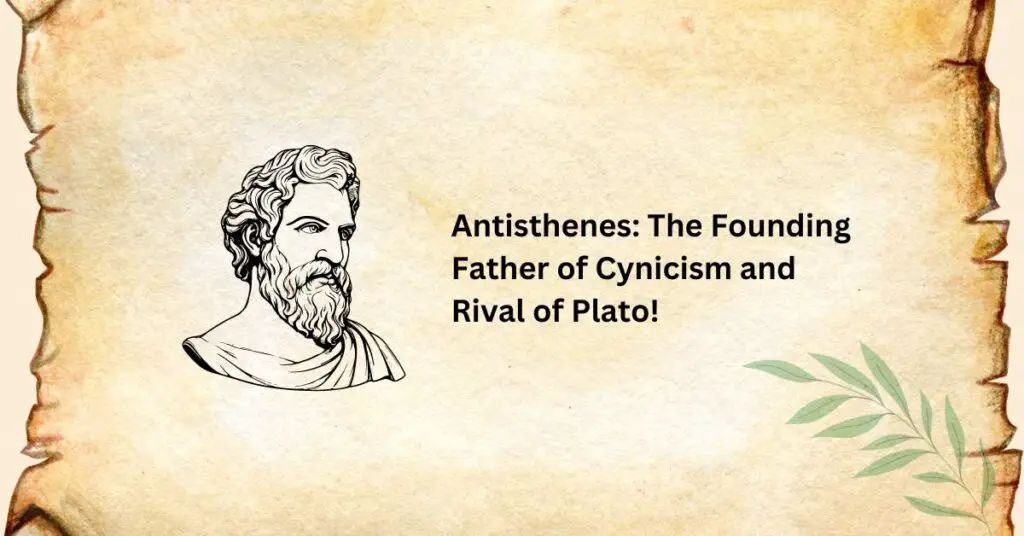Antisthenes: The Iconoclastic Cynic Who Shook Up Athens!
Ever heard of Socrates? The famous Greek philosopher who loved asking annoying questions? Well, Antisthenes was one of his star pupils, but unlike most A-students, Antisthenes took Socrates’ ideas and cranked them up to eleven!
He became the founding father (or maybe the cool uncle) of Cynicism, a philosophy that challenged the status quo of Ancient Greece in some pretty wild ways.
Antisthenes wasn’t interested in fancy clothes, big houses, or the latest gadgets. He was all about living a simple life based on virtue and reason. Sound interesting?
Stick around because we’re about to dive into the life and ideas of this radical thinker.
First up, let’s see how hanging out with Socrates shaped Antisthenes’ philosophy. Then, we’ll break down the core beliefs of Cynicism and why they were so controversial. Finally, we’ll explore Antisthenes’ legacy and see how his ideas continue to influence us today.
-
Background of Antisthenes
Early Life and Education:
Antisthenes was born around 445 BC in Athens, though some accounts suggest he was originally from Thrace.
His father, an Athenian citizen, and his mother, who was not Athenian, influenced his perspectives on society and citizenship from an early age. Antisthenes first studied rhetoric under the sophist Gorgias, which was typical for many young men of his status, seeking a career in politics or law.
This early education laid the groundwork for his critical approach to conventional rhetoric and the prevailing social norms of Athens.
Antisthenes Relationship with Socrates and Others:
The turning point in Antisthenes’ philosophical journey came with his introduction to Socrates. The exact circumstances of their meeting are not well-documented, but it is clear that Socrates had a profound impact on Antisthenes.
Under Socrates, he shifted from a sophisticated style of argumentation to a focus on ethics and the conduct of life. Unlike many of Socrates’ followers who were interested in abstract philosophical discussions, Antisthenes was deeply influenced by the practical aspects of Socratic teachings, emphasizing ethical living and self-sufficiency.
Antisthenes often found himself in philosophical disagreements with Plato, another prominent student of Socrates. Their differing interpretations of Socrates’ teachings highlight the diverse philosophical directions taken by Socrates’ disciples.
While Plato leaned toward metaphysical themes and the theory of Forms, Antisthenes remained grounded in a more tangible and immediate approach to ethics and personal conduct.
Key Events That Shaped Antisthenes’ Philosophical Viewpoints
Several key events influenced Antisthenes’ philosophical outlook. The Peloponnesian War, which devastated Athens and led to dramatic social and economic changes, profoundly impacted his views on power and wealth. The eventual fall of Athens to Sparta likely reinforced his skepticism toward the conventional pursuit of glory and power, highlighting the virtues of self-sufficiency and an ascetic lifestyle instead.
The death of Socrates in 399 BC was another pivotal moment for Antisthenes. Witnessing his mentor’s trial and execution reinforced his disdain for the Athenian state and its values, driving him to criticize the city’s political and social corruption more openly.
This event catalyzed his complete break from traditional values, leading him to establish Cynicism as a formal school of philosophy that promoted living in virtue in stark opposition to the prevailing norms of society.
-
Philosophical Teachings and Contributions
Overview of Cynicism: Definition and Core Principles
Cynicism, as established by Antisthenes, is a philosophical school that advocates living in virtue in accordance with nature and rejecting conventional desires for wealth, power, and fame.
Central to Cynicism is the idea of achieving eudaimonia (happiness or flourishing) through living a life of virtue in simplicity and rejecting societal norms.
Cynics emphasized the importance of self-sufficiency, austerity, and shamelessness, which they believed freed individuals from the constraints and corruptions of society.
-
Detailed Discussion of Antisthenes’ Teachings
Antisthenes’ Views on Virtue and Happiness:
For Antisthenes, virtue was not only the most essential thing in life but was synonymous with happiness. He famously stated that “the wise man is sufficient unto himself for a happy existence,” which underscores his belief that true happiness comes from internal virtue rather than external goods.
Antisthenes taught that happiness could be achieved through rigorous self-discipline and the cultivation of personal virtues such as courage, integrity, and independence.
His Beliefs Regarding Wealth, Power, and Social Status:
Antisthenes was critical of the pursuit of wealth, power, and social status, seeing them as distractions from the pursuit of virtue and happiness.
He argued that these pursuits led to unethical behavior and were contrary to living a life in harmony with nature. His teachings encouraged a rejection of materialism and superficial values, promoting a lifestyle that values ethics over material wealth.
The Concept of Self-sufficiency (Autarkeia) and Ascetic Lifestyle:
One of the key components of Antisthenes’ philosophy is the concept of ‘autarkeia’, or self-sufficiency. He believed that true contentment comes from being self-reliant and that external circumstances should not influence one’s happiness.
This belief led him to advocate for an ascetic lifestyle, minimal in needs and desires, as the pathway to achieving self-sufficiency.
His lifestyle and teachings attracted many followers who admired his commitment to living according to his principles, often in stark contrast to the opulence of Athenian society.
Antisthenes’ Most Famous Quotes and Writings:
Antisthenes’ teachings are often encapsulated in his sharp, pithy sayings that reflect his disdain for conventional values and his emphasis on virtue.
For example, his quote, “I would rather go mad than feel pleasure,” highlights his skepticism towards physical pleasures and the common pursuit of hedonism.
This statement, along with others like “The most necessary thing is to unlearn evil,” which he often used to express the importance of shedding societal vices, provides deep insights into his philosophical stance and the radical nature of Cynicism.
-
Antisthenes’ Impact and Legacy
Influence on His Contemporaries and the Development of Cynic Philosophy:
Antisthenes’ teachings had a profound impact on his contemporaries, catalyzing the development of Cynic philosophy, which embraced a radical form of asceticism and defiance of conventional values.
His emphasis on living in virtue, regardless of societal norms, drew a significant following during his lifetime. His approach to philosophy was seen as a practical guide to living rather than merely theoretical discourse, distinguishing Cynicism from other philosophical schools that emerged around the same time.
His most notable follower, Diogenes of Sinope, took Antisthenes’ principles even further, embodying the Cynic ideals of austerity and shamelessness more famously and dramatically.
Diogenes’ actions and teachings, inspired by Antisthenes, helped establish the Cynic tradition as a significant philosophical movement known for challenging societal norms and encouraging a return to a natural and self-sufficient life.
Antisthenes’ Role in the Transition from Classical to Hellenistic Philosophy:
Antisthenes played a critical role in the transition from classical to Hellenistic philosophy. His teachings emerged at a time when Athens was undergoing significant social and political changes.
The skepticism he and his followers expressed towards traditional values and institutions reflected a broader shift in Greek society from the polis-centered classical era to the more cosmopolitan and diverse Hellenistic period.
This transition saw a growing disillusionment with traditional politics and a turn towards personal ethics and self-care, themes central to Antisthenes’ philosophy.
Legacy and How Antisthenes’ Teachings Influenced Later Philosophers Like Diogenes and Crates
The legacy of Antisthenes is most vividly continued through the lives and teachings of later Cynic philosophers such as Diogenes of Sinope and Crates of Thebes. These philosophers not only adopted Antisthenes’ disdain for materialism and social prestige but also popularized the Cynic lifestyle of living in accordance with nature, devoid of societal luxuries.
Diogenes, in particular, became a legendary figure, often considered the archetype of Cynicism, whose radical simplicity and challenge to authority encapsulated the spirit of Antisthenes’ teachings.
Crates, another follower, married Hipparchia, a woman who chose to live the Cynic lifestyle, illustrating how Cynicism also challenged societal norms regarding gender roles and domestic life.
Their choice to live a simple, virtuous life in public view echoed Antisthenes’ call for a return to natural living and had a lasting impact on the development of Stoicism, particularly in the works of Zeno of Citium, who was influenced by Crates.
-
The Relevance of Antisthenes Today
Application of Cynic Philosophy in Modern Contexts:
In today’s world, where consumerism and material excess are often seen as markers of success, Antisthenes’ teachings offer a compelling counter-narrative.
The Cynic philosophy’s call for simplicity and focus on virtue over material wealth can be seen in modern movements towards minimalism and sustainable living. These contemporary trends reflect a desire to strip away the unnecessary, focusing on what truly contributes to personal and environmental well-being.
Lessons from Antisthenes That Address Contemporary Issues
Antisthenes’ critique of materialism and emphasis on ethical living resonates strongly with current discussions about ethical consumption and the impact of lifestyle choices on the environment. His ideas challenge individuals to consider how their pursuit of wealth and status detracts from their moral and spiritual development.
Furthermore, in a society facing rampant consumerism, his teachings encourage a more conscious approach to living, where personal satisfaction is derived from self-improvement and living harmoniously with others and nature rather than from accumulating possessions.
The Resurgence of Interest in Minimalist and Sustainable Lifestyles Reflecting Cynic Ideals
There has been a notable resurgence in minimalist lifestyles, which mirror the Cynic emphasis on living with only what is necessary and finding freedom in detachment from material goods.
The growing popularity of sustainability also echoes Cynic values, as people increasingly opt for lifestyles that are less about personal gain and more about contributing positively to the community and the planet.
This modern adoption of Cynic principles highlights the enduring relevance of Antisthenes’ teachings.
-
Comparative Analysis
Stoicism VS Epicureanism VS Cynicism:
- Stoicism: Like Cynicism, Stoicism advocates self-control and detachment from destructive emotions. However, Stoicism places more emphasis on the acceptance of fate and the importance of reason in achieving peace of mind. Stoics also viewed themselves as part of a larger societal and cosmic order, which contrasts with the Cynic focus on individual self-sufficiency and defiance of societal norms.
- Epicureanism: Epicureans, much like Cynics, valued a life free from unnecessary desires, but their approach centered on achieving pleasure and avoiding pain. Epicureans saw pleasure as the highest good, but like Antisthenes, they advocated for a simple life to attain tranquility, differing fundamentally in their justification for simplicity.
Differences Between Antisthenes and Socrates:
While both Socrates and Antisthenes valued virtue and ethical living, their approaches diverged significantly. Socrates used philosophical inquiry to explore a wide range of ethical and metaphysical topics, often without arriving at definitive conclusions.
On the other hand, Antisthenes was more direct and prescriptive, emphasizing a practical approach to ethics that involved living in accordance with strict principles. Despite these differences, Antisthenes carried forward Socrates’ disdain for materialism and his belief in the importance of personal integrity and virtue.
Conclusion
Antisthenes, the founder of Cynic philosophy, remains a pivotal figure whose teachings on virtue, simplicity, and ethical living resonate deeply today. His critique of materialism and emphasis on living in accordance with nature challenges us to reconsider modern values and the pursuit of external success.
The resurgence of minimalist and sustainable lifestyles reflects his ideas, showing the relevance of his ancient wisdom in our contemporary world.
By comparing Antisthenes with his mentor, Socrates, and other philosophical schools, we gain a broader understanding of his unique approach to philosophy, which emphasizes practical ethics over theoretical discourse.
Antisthenes’ legacy is a testament to the enduring appeal of living a life focused on virtue and self-sufficiency. His philosophy not only enriches our historical understanding but also offers practical insights for those seeking a meaningful and virtuous life today. This blog aims to inspire readers to explore these philosophical principles further and to apply them in navigating the complexities of modern life.



